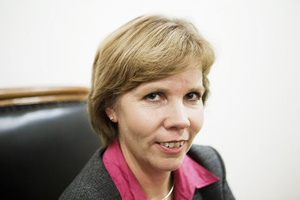 Calls inspired by Icelandic block of violent material.
Calls inspired by Icelandic block of violent material.
Finnish Minister for Justice, Anna-Maja Henriksson (pictured), is backing extending Finland's current pornography censorship to move beyond child pornography. Under current Finnish law, the NBI (National Bureau of Investigation) maintains a blocklist of foreign sourced child pornography websites, as it cannot take direct action against them.
Specifically, the Minister eyes expanding the list to involve websites that include pornographic material showing animals, and "violent porn."
The idea does not have unanimous support even within the Finnish government, however. Finland's Interior Minister, Päivi Räsänen, doubts the need to expand pornographic censorship at all. Indeed, even Finland's own child pornography blocklist has, in the past, included websites that had nothing to do with such vile content.
Still, child pornography blocklists are a reality that even many of the most vocal opponents of censorship accept as reasonable, and justified. The spreading of material that documents the sexual abuse of children prolongs one of the most abhorrent crimes, and re-victimizes the child every time it occurs.
To most people, animal porn also would be distasteful, if not downright sick, but does the spread of those kinds of videos or images demand the same special censorship enforcement afforded to child pornography?
Where the proposal would raise most questions however, is the inclusion of "violent pornography." Who decides what "violent pornography" is?
In all of these debates over censorship, that is the question that will never go away; who makes the decisions? Who in society can we possibly elect to decide for us on questions of appropriate, or inappropriate content? Most adults would not knowingly grant this power to anybody in their lives, so why is the state/government any different?
Then last, but definitely not least, is the precedent: If we can block pornography that we deem inappropriate, then why not other things that we don't like?
The reason to take notice of this case - even though it is unlikely to make it into law - is Finland can fairly be seen as an advanced, progressive state with an educated population, well grounded in modern technology, and a highly respected member of the European Union. When Western countries (or those of Western values) speak so openly about the problem of censorship to the East (or speak through a conduit like the EU), and then witness members of their own elected governments pushing proposals to block Internet content that they do not like, how can the message of free expression/speech and information hold its weight?
Am I wrong?
(image credit & source: aamulehti.fi)
Specifically, the Minister eyes expanding the list to involve websites that include pornographic material showing animals, and "violent porn."
The idea does not have unanimous support even within the Finnish government, however. Finland's Interior Minister, Päivi Räsänen, doubts the need to expand pornographic censorship at all. Indeed, even Finland's own child pornography blocklist has, in the past, included websites that had nothing to do with such vile content.
Still, child pornography blocklists are a reality that even many of the most vocal opponents of censorship accept as reasonable, and justified. The spreading of material that documents the sexual abuse of children prolongs one of the most abhorrent crimes, and re-victimizes the child every time it occurs.
To most people, animal porn also would be distasteful, if not downright sick, but does the spread of those kinds of videos or images demand the same special censorship enforcement afforded to child pornography?
Where the proposal would raise most questions however, is the inclusion of "violent pornography." Who decides what "violent pornography" is?
In all of these debates over censorship, that is the question that will never go away; who makes the decisions? Who in society can we possibly elect to decide for us on questions of appropriate, or inappropriate content? Most adults would not knowingly grant this power to anybody in their lives, so why is the state/government any different?
Then last, but definitely not least, is the precedent: If we can block pornography that we deem inappropriate, then why not other things that we don't like?
The reason to take notice of this case - even though it is unlikely to make it into law - is Finland can fairly be seen as an advanced, progressive state with an educated population, well grounded in modern technology, and a highly respected member of the European Union. When Western countries (or those of Western values) speak so openly about the problem of censorship to the East (or speak through a conduit like the EU), and then witness members of their own elected governments pushing proposals to block Internet content that they do not like, how can the message of free expression/speech and information hold its weight?
Am I wrong?
(image credit & source: aamulehti.fi)












